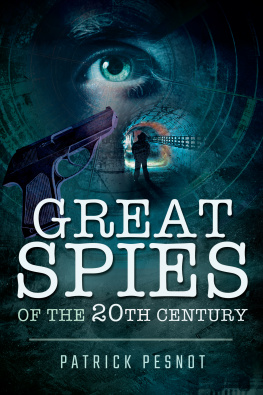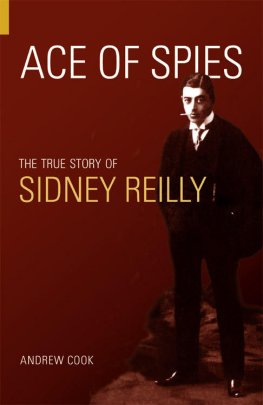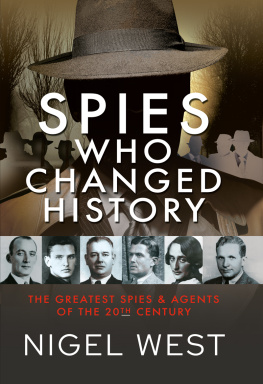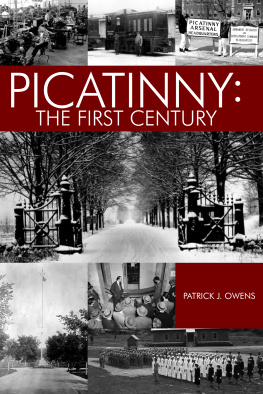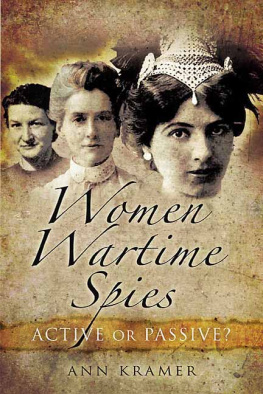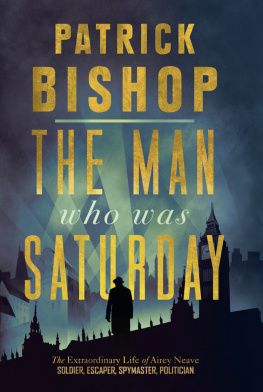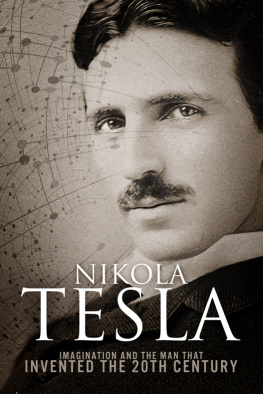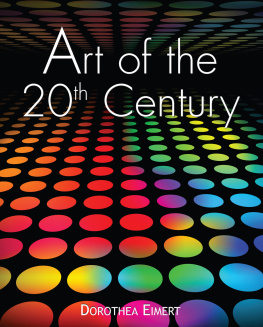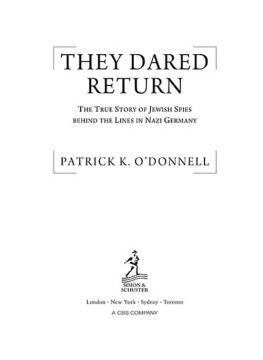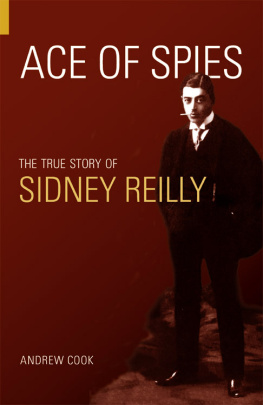Patrick Pesnot - Great Spies of the 20th Century
Here you can read online Patrick Pesnot - Great Spies of the 20th Century full text of the book (entire story) in english for free. Download pdf and epub, get meaning, cover and reviews about this ebook. year: 2016, publisher: Pen & Sword Books, genre: Science. Description of the work, (preface) as well as reviews are available. Best literature library LitArk.com created for fans of good reading and offers a wide selection of genres:
Romance novel
Science fiction
Adventure
Detective
Science
History
Home and family
Prose
Art
Politics
Computer
Non-fiction
Religion
Business
Children
Humor
Choose a favorite category and find really read worthwhile books. Enjoy immersion in the world of imagination, feel the emotions of the characters or learn something new for yourself, make an fascinating discovery.
- Book:Great Spies of the 20th Century
- Author:
- Publisher:Pen & Sword Books
- Genre:
- Year:2016
- Rating:5 / 5
- Favourites:Add to favourites
- Your mark:
- 100
- 1
- 2
- 3
- 4
- 5
Great Spies of the 20th Century: summary, description and annotation
We offer to read an annotation, description, summary or preface (depends on what the author of the book "Great Spies of the 20th Century" wrote himself). If you haven't found the necessary information about the book — write in the comments, we will try to find it.
Great Spies of the 20th Century — read online for free the complete book (whole text) full work
Below is the text of the book, divided by pages. System saving the place of the last page read, allows you to conveniently read the book "Great Spies of the 20th Century" online for free, without having to search again every time where you left off. Put a bookmark, and you can go to the page where you finished reading at any time.
Font size:
Interval:
Bookmark:



First published in Great Britain in 2016 by
PEN & SWORD MILITARY
an imprint of
Pen and Sword Books Ltd
47 Church Street
Barnsley
South Yorkshire S70 2AS
Copyright Patrick Pesnot, 2016
ISBN 978 1 47386 219 7
The right of Patrick Pesnot to be identified as the author of this work has been asserted by him in accordance with the Copyright, Designs and Patents Act 1988.
A CIP record for this book is available from the British Library.
All rights reserved. No part of this book may be reproduced or transmitted in any form or by any means, electronic or mechanical including photocopying,recording or by any information storage and retrieval system, without permission from the Publisher in writing.
Printed and bound in England by CPI Group (UK) Ltd, Croydon, CR0 4YY
Pen & Sword Books Ltd incorporates the imprints of Pen & Sword Archaeology, Atlas, Aviation, Battleground, Discovery, Family History, History, Maritime, Military, Naval, Politics, Railways, Select, Social History, Transport, True Crime, and Claymore Press, Frontline Books, Leo Cooper, Praetorian Press, RememberWhen, Seaforth Publishing and Wharncliffe.
For a complete list of Pen and Sword titles please contact
Pen and Sword Books Limited
47 Church Street, Barnsley, South Yorkshire, S70 2AS, England
E-mail:
Website: www.pen-and-sword.co.uk
Contents
Acknowledgements
Thank you to Rbecca Denantes, Yannick Dehe, Jean-Pierre Guno, Ilinca Negulesco, Catherine Pesnot and Sabine Sportouch.
Authors note
Spies have one particularity: they only talk about themselves once their identity has been revealed. This means that in the dark world of intelligence, there are no doubt many spies out there who have not yet been caught. Whether they are sleeper agents or active moles, they remain hidden away.
The spies who feature in this book, be they heroic or pitiful, patriots or traitors, disinterested or greedy, have been in the media spotlight and have often paid for their secretive work either with their lives, or years of imprisonment. Yet they have rarely revealed their secrets. The object of this new book, based on the revelations of Mr X, is to clarify this matter.
More broadly, this bouquet of spies of all nationalities brings us closer to the reality of contemporary espionage and the existence of these intelligence minions, who have entrusted their fate to those cold monsters of the secret services of powerful nations.
Patrick Pesnot
Chapter 1
Blunt: the Gentleman Spy
He was a gentleman through and through. Dark suit with thin blue stripes, red tie, and a blue shirt on a thin, lanky and slightly arched body. His long, bony face had a melancholy expression, which flashed a clear but cold look. His wavy hair, just a little long, was impeccably parted on the left-hand side. This gentleman was a regular at Buckingham Palace, a Knight of the Realm and also a Commander in the order of the Lgion dhonneur. Yet Sir Anthony Blunt was also a spy. He was one of the Cambridge Five; five traitors taken from the upper echelons of English society, who during World War Two and the following years, rendered immense services to the Soviets.
Mr X has already discussed this matter by drawing particular attention to the most flamboyant of them, Kim Philby, a character who seems to have come straight out of a John Le Carr novel. However, he has remained very discreet about Anthony Blunt, a great art historian and member of the Queens counsel, whose role was only made public at the end of the 1970s. For a long time the British counterintelligence service knew the full truth about Sir Anthony, who were he alive today, would be over 100-years old. Yet no accusations were made against him. This is not the only mystery in an affair where there are still secrets yet to be revealed. It is a dossier that has all the ingredients of a very British scandal, mixing sex, politics and betrayal.
A recent and accurate biography of Anthony Blunt evokes the double life of this gentleman spy, who effectively had the characteristics of a chameleon. On the one hand, he presented himself as the perfect product of British High Society: an aesthete who had gone to the most prestigious schools in the kingdom, an art historian whose works were an authority and who personally watched over the collections of the royal family. Yet on the other hand, he was an ambivalent character who drank too much and in a time of very strict morals, hid as much of his homosexuality as he could.
The last dark side of his character was his life as a spy. A spy who, let us say from the outset, was betrayed, at least initially, by idealism. The Soviets rarely paid for his services, and if they did it was only in small amounts. As a homosexual, Blunt could also have been subjected to blackmail. However, it does not appear that his successive contract officers profited from this, even though as KGB agents, they did not hesitate to use all manners of sexual exploitation to recruit their spies. Yet this was not necessary in Blunts case; his commitment was sincere.
This affair hides a story within a story. While there is no doubt of Blunts betrayal, doesnt the fact that it was hidden for so long mean that it was also hiding something else? And why did Margaret Thatcher believe she was right to reveal the truth so soon after coming to power?
Anthony Blunt was the third son of a modest vicar. Nevertheless, he was distantly related to the royal family through his mother, who was second cousin to the future Elizabeth IIs father [George VI]. Despite the relative poverty of his parents, he began his studies at a renowned public school [Marlborough College], where discipline was ruthless and where living conditions were very harsh. The young Anthony swept up all the top honours and gained a scholarship to the famous Trinity College at Cambridge. which would be crucible for the training of the future Cambridge Five. After studying modern languages, this talented young man then joined the so-called Bloomsbury Group, a circle of artists and intellectuals, whose members included Virginia Woolf. The group brought together intellectuals who wanted to break away from the social norms of the time, not only in artistic areas, but also religious, social and sexual matters as well.
At Cambridge, Blunt felt particularly comfortable in the Bloomsbury Group. Later, he was also admitted to another influential circle, the Apostles, a clandestine discussion group, which at the time was chaired by the future economist, John Maynard Keynes. For Blunt, it was about absolute social and intellectual recognition. What is more, the Apostles counted many other homosexuals among their members, such as the writer, John Foster.
In the very narrow world of Cambridge, Blunt, a brilliant conversationalist, was already considered an important figure, especially now he had found his true calling: art, or rather the research and critiquing of it. He had spent part of his childhood in Paris after his father was assigned as the vicar to the British Embassys chapel. He became infatuated with the work of the French painter, Nicolas Poussin, who is unjustly underestimated and even ignored in modern times. The young critic decided to bring him out of the shadows and gradually became the international expert on the painters works. At the beginning of the 1930s he wrote a brilliant thesis on the works of Poussin, which allowed him to make his debut as a speaker at the Courtauld Institute of Art, the first institute of its kind to be created in Britain. At the same time, he also wrote reviews for specialist journals.
Next pageFont size:
Interval:
Bookmark:
Similar books «Great Spies of the 20th Century»
Look at similar books to Great Spies of the 20th Century. We have selected literature similar in name and meaning in the hope of providing readers with more options to find new, interesting, not yet read works.
Discussion, reviews of the book Great Spies of the 20th Century and just readers' own opinions. Leave your comments, write what you think about the work, its meaning or the main characters. Specify what exactly you liked and what you didn't like, and why you think so.

